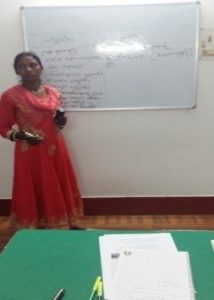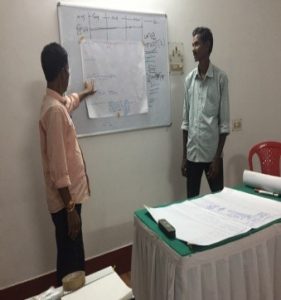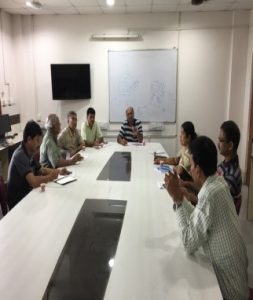The crop planning is an important activity of DSI4MTF project to get optimum level of market price. The series of farmers training as well as exposure to government departments helped the Dhaloguri (DH) and Uttar Chakowakheti ( UC ) farmers to think and cultivate differently. For successful Rabi cultivation in this season, planning meeting with lead farmers from each collectives sites (7 ) organized in both villages and CDHI campus since 19th August 2017. It was open discussion among the farmers and logical sharing and reflection between UBKV scientists and farmers about the crops choice. Finally the crop choices of farmers are appreciated by CDHI-UBKV.
It was great that crop planning for Rabi started from monsoon / kharif season so that timing of seed bed preparation, transplanting etc does not disturb the Rabi cultivation. The farmers and project team members had sufficient time to discuss their experience, potentialities of different crop varieties, use of technologies and probable risks factors. The following table shows the village and site wise selected crops by the farmers and land coverage for each crop.
| Site No and Name of the CFGs | Crops | Land area | Comments |
| UC site-I | Zero tillage Mustard | 12 bigha / 1.6 ha | All sites of UC emphasising on mustard due to good experience from last Rabi season as well as planned to setting up mini oil mill in the village by the collective groups in 2018-19. |
| Zero tillage Wheat | 1 bigha / 0.13 ha | ||
| UC site-II | Zero tillage Mustard | 5 bigha / 0.67 ha | |
| Zero tillage Wheat | 2 bigha / 0.27 ha | ||
| UC site-III | Mustard | 5 bigha / 0.67 ha | |
| Wheat | 3 bigha / 0.40 ha | ||
| Potato | 2 bigha / 0.27 ha | ||
| Radish | 8 katha / 0.053 ha | ||
| Cabbage | 5 katha / 0.033 ha | ||
| Cauliflower | 5 katha / 0.033 ha | ||
| UC site-IV ( Replicated ) | Mustard / Wheat | 3 bigha / 0.40 ha | |
| Poly house | Capsicum | 1.2 katha / 0.008 ha | |
| DH site-I | Tomato | Farmers will decide collectively very soon | Rich farmer is having limited land and hesitant for collectivization |
| Cauliflower | |||
| Cabbage | |||
| DH site-II | Broccoli | 5 katha /0.033 ha | Garlic cultivation depends on availability of seeds. |
| Cabbage | 10 katha / 0.067 ha | ||
| Cauliflower | 10 katha / 0.067 ha | ||
| Garlic | 15 katha / 0.10 ha | ||
| Beans and pumpkin | Surrounding the plots | ||
| DH site-III | Potato | 6 bigha / 0.8 ha | Mustard will protect the pests and insects. |
| Garlic | 1 bigha / 0.13 ha | ||
| Beans and mustard | Surrounding the plots | ||
| Poly house | Capsicum | 5 katha / 0.033 ha |








